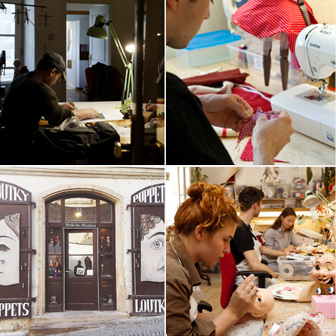Marionettes.cz
- Puppets
- Puppets For Kids and Fans
Our Puppets For Kids and Fans page offers a fantastic selection of handmade marionettes, suitable for both beginners and seasoned puppeteers. We’ve categorized these puppets to make browsing easy, helping you find the perfect one for your needs. Whether you're looking for classic characters, animals, or something unique, these marionettes are crafted with care in the Czech Republic, blending tradition and quality. Explore the variety and discover a puppet that will capture your heart!
- Art Puppets
Art Marionettes are our best selection of puppets that are both unique and special in every possible way. Each creation is an original detailed piece of art. Art Marionettes will make a wonderful addition to your collection and they will bring joy and beauty into your home. Lifetime figurines that age like wine...For better clarity we've sorted them into a few categories bellow. So look at and enjoy :) Katerina Novakova
- Performance Puppets
They are fully functional professionally articulated and balanced puppets. You'll meet them on the street, at a party, or in a video somewhere on social media. You can choose from our existing range, or you can come up with your own idea and we will make a professional puppet for you.
- Custom
We are mastering the technique of hand carving and the modern technique of 3D printing. We use top-quality materials and techniques. We are able to communicate with you on a daily basis during the project to find the best possible way how to make your ideas come true.
- Publications
A wide range of magazines and publications are dedicated to the art of puppetry. These publications cover various aspects of puppetry, from its history in the Czech Republic to contemporary practices. They include both print and digital formats, offering detailed insights into the craftsmanship, tradition, and storytelling that puppetry embodies. This collection is perfect for enthusiasts, collectors, or anyone interested in exploring the world of marionettes.
- Exhibition in Biarritz, France
Marionettes.cz Showcases a Contemporary Collection of Czech Puppetry Our marionettes have successfully captivated audiences in France! Invited to the prestigious exhibition in Biarritz, a picturesque town on the southwest coast, we proudly showcased a stunning contemporary collection of Czech puppetry. The event featured an extraordinary array of marionettes, offering a diverse range of types, sizes, and styles, beautifully blending traditional craftsmanship with modern artistry. This remarkable opportunity allowed us to represent one of the oldest and most cherished Czech traditions on an international stage. Our puppets enchanted both professionals and art enthusiasts alike, reaffirming the global appeal of Czech culture. The success of the exhibition is a testament to the enduring magic of puppetry and its ability to bring people together through creativity and tradition. We are honored to have brought a piece of Czech heritage to such a prestigious platform in Biarritz.
- Puppets For Kids and Fans
- DIY & Parts
- Do it yourself - KITs
Make your own marionettes. You're skilled to and we know it! Assemble a puppet from a pre-prepared set. Parts for making puppets. Made in Czech Republic. Safe materials. Wooden toys. Quality Czech product.
- Material for puppet construction
We’re excited to offer a wide range of top-quality materials and accessories for crafting your own marionettes! Whether you're a seasoned professional or just starting out as a hobbyist, we have everything you need to bring your puppets to life. Our selection includes premium wood, strong and durable strings, and finely detailed hardware, ensuring that your marionettes are both functional and beautifully handcrafted. We take pride in providing products that help you express your creativity while making sure your creations are built to last. Whatever your project, we’re here to support you every step of the way!
- Marionette Stands
Marionette stands are vital in the marionette world, supporting beautifully crafted puppets for display. Typically made of wood, the stands are designed to hold the marionette upright and prevent string tangling. They also showcase the puppets as decorative art pieces, reflecting the artistry and tradition of Czech puppet-making. Whether in a theater or a collector's home, marionette stands to preserve and enhance the charm of these iconic cultural treasures.
- Control devices for marionettes
Our marionette controllers are designed to offer precise and effortless manipulation for both beginners and professionals. Crafted from high-quality wood and metal, they provide excellent balance and control, making it easy to bring your puppets to life. Whether you're aiming for subtle gestures or complex movements, our selection ranges from simple crossbar designs to more advanced systems, ensuring the perfect fit for any skill level. With our controllers, you'll enjoy smooth, natural movements that enhance the artistry of puppeteering.
- Marionette bodies, heads, shoes
On our Bodies and Heads, Marionette Parts & Shoes page, we offer a variety of high-quality components to help you create or customize your marionettes. Our selection includes intricately crafted heads, fully formed bodies and detailed shoes, all available in different sizes and styles to match your puppet's character. Whether you're assembling a new marionette or giving an existing one a fresh look, these parts ensure both durability and artistic detail, making your creations stand out.
- Do it yourself - KITs
- Puppets for 3D printing
- Complete puppets for 3D printing
Here we have our database of animal puppets ready to print on 3D printers. We can also customize the files to your needs. The license for each file allows you to print up to 5 pieces. Please note that the price of your order includes only the electronic 3D model file (*.stl). The printing of your puppet is up to you :) Enjoy!
- Bodies for 3D printing
In this category, you’ll find a variety of 3D models of marionette bodies, ready to form the foundation of your puppet. From simple base structures to more detailed designs, these files provide the essential framework on which you can build character, personality, and movement. Whether you’re creating a traditional marionette or experimenting with a modern twist, our models give you a solid starting point. All files are provided in *.stl format and carefully prepared for straightforward 3D printing and assembly. Your order includes the digital file only—printing, finishing, and bringing your marionette to life is in your hands. Enjoy shaping your own unique puppets, starting from the body up!
- Heads for 3D printing
Here we have our database of marionette heads ready for printing at 3D printers. We can also customise the files to suit your needs. Please note your the price of your order includes an electronic file with 3D model (*.stl) only. The printing of your marionette is down to you :)Enjoy!
- Shoes for 3D printing
Here you can explore our collection of 3D models for marionette footwear and accessories, ready to bring extra detail and character to your creations. From casual Converse to elegant polished shoes or sporty basketball sneakers, you’ll find styles to suit a wide range of puppet personalities. Each file comes in *.stl format, prepared for smooth 3D printing and easy integration with your puppet designs. The models are carefully designed to balance aesthetics with practicality, making them both stylish and functional. If you need something special, we can also create customized designs to fit your vision. Please note that your purchase provides the digital file only—the printing and assembly of your marionette’s shoes and accessories is up to you.
- Hands for 3D printing
Discover our collection of 3D-printable marionette hands, designed to give your puppets personality and expression. Hands are an essential detail in puppet-making, whether you’re aiming for a classic theatrical look, a playful character, or a more realistic design. Our database offers ready-to-print models that you can easily incorporate into your own marionette projects, making it simple to add that final touch of craftsmanship.
- Controllers and Eye mechanics
In this category, you’ll find a collection of 3D-printable files dedicated to marionette controllers and eye mechanisms. These essential components bring your puppets to life—controllers give you precise movement and expression, while eye mechanisms add a captivating layer of realism and character. Whether you’re a puppeteer, hobbyist, or professional creator, our designs are ready to be downloaded and printed, making it easier than ever to build or customize your own marionette. All files are provided in the standard *.stl format and optimized for 3D printing. Each design has been carefully prepared to balance functionality and ease of assembly, so you can focus on the creative part of your puppet-making. We also offer customization of the models to fit your specific needs. Please keep in mind that your purchase includes only the digital file—printing and assembling your marionette pieces is part of your own creative journey.
- Props for 3D printing
In this category you will find a number of different props in 3D models. Now you can print props of guitar, piano, and other musical instruments on a 3D printer.
- Complete puppets for 3D printing
- Antique
- Courses
- Puppet Carving
Turn wood into a puppet according to your imagination. It is our imagination and energy that transform a piece of wood into a puppet. Wood has its own structure, which guides our chisel. If we are attentive and open to improvisation, even a random cut can inspire us on where to go next in seeking its shape and expression. Then, through it, we can tell stories...
- Puppet Therapy
We will let you understand how to use puppets as an effective therapy tool. See how we are developing a methodology to teach this phenomenon. Join the global project and see the courses we run.
- Puppet Building
Learn to assemble and decorate your own wooden puppet under the leadership of our experienced puppeteers and teachers. You can choose from courses that are simple or more advanced. Experience the joy of building your very own marionette. Connect beauty and function. Reality and imagination. Matter and spirit. Puppet and puppeteer. The old puppeteers always said “A puppet must be made to be beautiful and to play itself”, and I would only add that this is a task full of many crafts. Petr PuppeteerSenior Puppet Technologist – PUP
- Puppet Animation
Here you will find courses on rules and techniques to set you free in expressing your intention with the puppets. A puppet is like a shield to hide behind. It's giving you the freedom to say and act whatever you feel and want. We will teach you the technique.
- Puppet Carving
- Sale
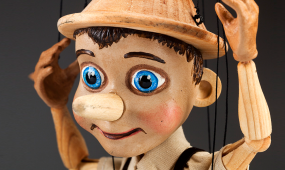 Our Puppets For Kids and Fans page offers a fantastic selection of handmade marionettes, suitable for both beginners and seasoned puppeteers. We’ve categorized these puppets to make browsing easy, helping you find the perfect one for your needs. Whether you're looking for classic characters, animals, or something unique, these marionettes are crafted with care in the Czech Republic, blending tradition and quality. Explore the variety and discover a puppet that will capture your heart!
Our Puppets For Kids and Fans page offers a fantastic selection of handmade marionettes, suitable for both beginners and seasoned puppeteers. We’ve categorized these puppets to make browsing easy, helping you find the perfect one for your needs. Whether you're looking for classic characters, animals, or something unique, these marionettes are crafted with care in the Czech Republic, blending tradition and quality. Explore the variety and discover a puppet that will capture your heart!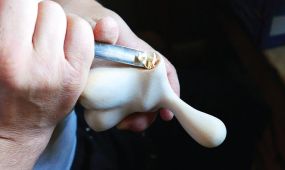 Art Marionettes are our best selection of puppets that are both unique and special in every possible way. Each creation is an original detailed piece of art. Art Marionettes will make a wonderful addition to your collection and they will bring joy and beauty into your home. Lifetime figurines that age like wine...For better clarity we've sorted them into a few categories bellow. So look at and enjoy :)
Katerina Novakova
Art Marionettes are our best selection of puppets that are both unique and special in every possible way. Each creation is an original detailed piece of art. Art Marionettes will make a wonderful addition to your collection and they will bring joy and beauty into your home. Lifetime figurines that age like wine...For better clarity we've sorted them into a few categories bellow. So look at and enjoy :)
Katerina Novakova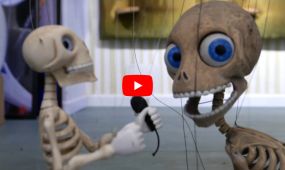 They are fully functional professionally articulated and balanced puppets. You'll meet them on the street, at a party, or in a video somewhere on social media. You can choose from our existing range, or you can come up with your own idea and we will make a professional puppet for you.
They are fully functional professionally articulated and balanced puppets. You'll meet them on the street, at a party, or in a video somewhere on social media. You can choose from our existing range, or you can come up with your own idea and we will make a professional puppet for you.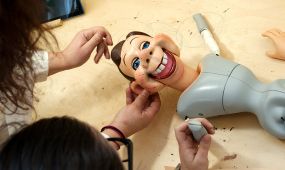 We are mastering the technique of hand carving and the modern technique of 3D printing. We use top-quality materials and techniques. We are able to communicate with you on a daily basis during the project to find the best possible way how to make your ideas come true.
We are mastering the technique of hand carving and the modern technique of 3D printing. We use top-quality materials and techniques. We are able to communicate with you on a daily basis during the project to find the best possible way how to make your ideas come true.
 A wide range of magazines and publications are dedicated to the art of puppetry. These publications cover various aspects of puppetry, from its history in the Czech Republic to contemporary practices. They include both print and digital formats, offering detailed insights into the craftsmanship, tradition, and storytelling that puppetry embodies. This collection is perfect for enthusiasts, collectors, or anyone interested in exploring the world of marionettes.
A wide range of magazines and publications are dedicated to the art of puppetry. These publications cover various aspects of puppetry, from its history in the Czech Republic to contemporary practices. They include both print and digital formats, offering detailed insights into the craftsmanship, tradition, and storytelling that puppetry embodies. This collection is perfect for enthusiasts, collectors, or anyone interested in exploring the world of marionettes.  Marionettes.cz Showcases a Contemporary Collection of Czech Puppetry
Our marionettes have successfully captivated audiences in France! Invited to the prestigious exhibition in Biarritz, a picturesque town on the southwest coast, we proudly showcased a stunning contemporary collection of Czech puppetry.
The event featured an extraordinary array of marionettes, offering a diverse range of types, sizes, and styles, beautifully blending traditional craftsmanship with modern artistry.
This remarkable opportunity allowed us to represent one of the oldest and most cherished Czech traditions on an international stage. Our puppets enchanted both professionals and art enthusiasts alike, reaffirming the global appeal of Czech culture.
The success of the exhibition is a testament to the enduring magic of puppetry and its ability to bring people together through creativity and tradition. We are honored to have brought a piece of Czech heritage to such a prestigious platform in Biarritz.
Marionettes.cz Showcases a Contemporary Collection of Czech Puppetry
Our marionettes have successfully captivated audiences in France! Invited to the prestigious exhibition in Biarritz, a picturesque town on the southwest coast, we proudly showcased a stunning contemporary collection of Czech puppetry.
The event featured an extraordinary array of marionettes, offering a diverse range of types, sizes, and styles, beautifully blending traditional craftsmanship with modern artistry.
This remarkable opportunity allowed us to represent one of the oldest and most cherished Czech traditions on an international stage. Our puppets enchanted both professionals and art enthusiasts alike, reaffirming the global appeal of Czech culture.
The success of the exhibition is a testament to the enduring magic of puppetry and its ability to bring people together through creativity and tradition. We are honored to have brought a piece of Czech heritage to such a prestigious platform in Biarritz. Make your own marionettes. You're skilled to and we know it! Assemble a puppet from a pre-prepared set. Parts for making puppets. Made in Czech Republic. Safe materials. Wooden toys. Quality Czech product.
Make your own marionettes. You're skilled to and we know it! Assemble a puppet from a pre-prepared set. Parts for making puppets. Made in Czech Republic. Safe materials. Wooden toys. Quality Czech product.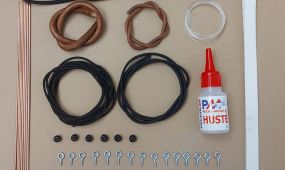 We’re excited to offer a wide range of top-quality materials and accessories for crafting your own marionettes! Whether you're a seasoned professional or just starting out as a hobbyist, we have everything you need to bring your puppets to life. Our selection includes premium wood, strong and durable strings, and finely detailed hardware, ensuring that your marionettes are both functional and beautifully handcrafted. We take pride in providing products that help you express your creativity while making sure your creations are built to last. Whatever your project, we’re here to support you every step of the way!
We’re excited to offer a wide range of top-quality materials and accessories for crafting your own marionettes! Whether you're a seasoned professional or just starting out as a hobbyist, we have everything you need to bring your puppets to life. Our selection includes premium wood, strong and durable strings, and finely detailed hardware, ensuring that your marionettes are both functional and beautifully handcrafted. We take pride in providing products that help you express your creativity while making sure your creations are built to last. Whatever your project, we’re here to support you every step of the way!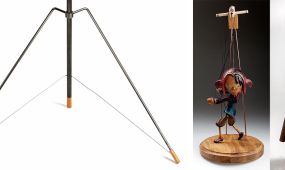 Marionette stands are vital in the marionette world, supporting beautifully crafted puppets for display. Typically made of wood, the stands are designed to hold the marionette upright and prevent string tangling. They also showcase the puppets as decorative art pieces, reflecting the artistry and tradition of Czech puppet-making. Whether in a theater or a collector's home, marionette stands to preserve and enhance the charm of these iconic cultural treasures.
Marionette stands are vital in the marionette world, supporting beautifully crafted puppets for display. Typically made of wood, the stands are designed to hold the marionette upright and prevent string tangling. They also showcase the puppets as decorative art pieces, reflecting the artistry and tradition of Czech puppet-making. Whether in a theater or a collector's home, marionette stands to preserve and enhance the charm of these iconic cultural treasures.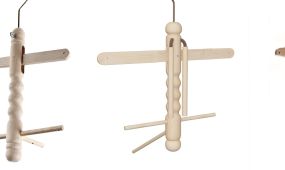 Our marionette controllers are designed to offer precise and effortless manipulation for both beginners and professionals. Crafted from high-quality wood and metal, they provide excellent balance and control, making it easy to bring your puppets to life. Whether you're aiming for subtle gestures or complex movements, our selection ranges from simple crossbar designs to more advanced systems, ensuring the perfect fit for any skill level. With our controllers, you'll enjoy smooth, natural movements that enhance the artistry of puppeteering.
Our marionette controllers are designed to offer precise and effortless manipulation for both beginners and professionals. Crafted from high-quality wood and metal, they provide excellent balance and control, making it easy to bring your puppets to life. Whether you're aiming for subtle gestures or complex movements, our selection ranges from simple crossbar designs to more advanced systems, ensuring the perfect fit for any skill level. With our controllers, you'll enjoy smooth, natural movements that enhance the artistry of puppeteering.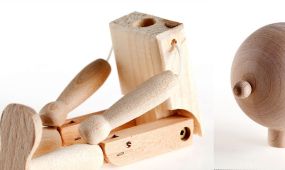 On our Bodies and Heads, Marionette Parts & Shoes page, we offer a variety of high-quality components to help you create or customize your marionettes. Our selection includes intricately crafted heads, fully formed bodies and detailed shoes, all available in different sizes and styles to match your puppet's character. Whether you're assembling a new marionette or giving an existing one a fresh look, these parts ensure both durability and artistic detail, making your creations stand out.
On our Bodies and Heads, Marionette Parts & Shoes page, we offer a variety of high-quality components to help you create or customize your marionettes. Our selection includes intricately crafted heads, fully formed bodies and detailed shoes, all available in different sizes and styles to match your puppet's character. Whether you're assembling a new marionette or giving an existing one a fresh look, these parts ensure both durability and artistic detail, making your creations stand out.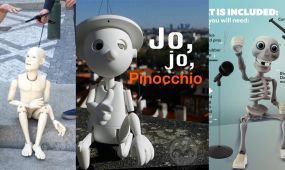 Here we have our database of animal puppets ready to print on 3D printers. We can also customize the files to your needs. The license for each file allows you to print up to 5 pieces.
Please note that the price of your order includes only the electronic 3D model file (*.stl). The printing of your puppet is up to you :)
Enjoy!
Here we have our database of animal puppets ready to print on 3D printers. We can also customize the files to your needs. The license for each file allows you to print up to 5 pieces.
Please note that the price of your order includes only the electronic 3D model file (*.stl). The printing of your puppet is up to you :)
Enjoy! In this category, you’ll find a variety of 3D models of marionette bodies, ready to form the foundation of your puppet. From simple base structures to more detailed designs, these files provide the essential framework on which you can build character, personality, and movement. Whether you’re creating a traditional marionette or experimenting with a modern twist, our models give you a solid starting point.
All files are provided in *.stl format and carefully prepared for straightforward 3D printing and assembly. Your order includes the digital file only—printing, finishing, and bringing your marionette to life is in your hands. Enjoy shaping your own unique puppets, starting from the body up!
In this category, you’ll find a variety of 3D models of marionette bodies, ready to form the foundation of your puppet. From simple base structures to more detailed designs, these files provide the essential framework on which you can build character, personality, and movement. Whether you’re creating a traditional marionette or experimenting with a modern twist, our models give you a solid starting point.
All files are provided in *.stl format and carefully prepared for straightforward 3D printing and assembly. Your order includes the digital file only—printing, finishing, and bringing your marionette to life is in your hands. Enjoy shaping your own unique puppets, starting from the body up! Here we have our database of marionette heads ready for printing at 3D printers. We can also customise the files to suit your needs. Please note your the price of your order includes an electronic file with 3D model (*.stl) only. The printing of your marionette is down to you :)Enjoy!
Here we have our database of marionette heads ready for printing at 3D printers. We can also customise the files to suit your needs. Please note your the price of your order includes an electronic file with 3D model (*.stl) only. The printing of your marionette is down to you :)Enjoy! Here you can explore our collection of 3D models for marionette footwear and accessories, ready to bring extra detail and character to your creations. From casual Converse to elegant polished shoes or sporty basketball sneakers, you’ll find styles to suit a wide range of puppet personalities.
Each file comes in *.stl format, prepared for smooth 3D printing and easy integration with your puppet designs. The models are carefully designed to balance aesthetics with practicality, making them both stylish and functional. If you need something special, we can also create customized designs to fit your vision. Please note that your purchase provides the digital file only—the printing and assembly of your marionette’s shoes and accessories is up to you.
Here you can explore our collection of 3D models for marionette footwear and accessories, ready to bring extra detail and character to your creations. From casual Converse to elegant polished shoes or sporty basketball sneakers, you’ll find styles to suit a wide range of puppet personalities.
Each file comes in *.stl format, prepared for smooth 3D printing and easy integration with your puppet designs. The models are carefully designed to balance aesthetics with practicality, making them both stylish and functional. If you need something special, we can also create customized designs to fit your vision. Please note that your purchase provides the digital file only—the printing and assembly of your marionette’s shoes and accessories is up to you.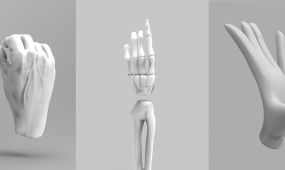 Discover our collection of 3D-printable marionette hands, designed to give your puppets personality and expression. Hands are an essential detail in puppet-making, whether you’re aiming for a classic theatrical look, a playful character, or a more realistic design. Our database offers ready-to-print models that you can easily incorporate into your own marionette projects, making it simple to add that final touch of craftsmanship.
Discover our collection of 3D-printable marionette hands, designed to give your puppets personality and expression. Hands are an essential detail in puppet-making, whether you’re aiming for a classic theatrical look, a playful character, or a more realistic design. Our database offers ready-to-print models that you can easily incorporate into your own marionette projects, making it simple to add that final touch of craftsmanship.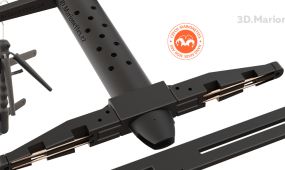 In this category, you’ll find a collection of 3D-printable files dedicated to marionette controllers and eye mechanisms. These essential components bring your puppets to life—controllers give you precise movement and expression, while eye mechanisms add a captivating layer of realism and character. Whether you’re a puppeteer, hobbyist, or professional creator, our designs are ready to be downloaded and printed, making it easier than ever to build or customize your own marionette.
All files are provided in the standard *.stl format and optimized for 3D printing. Each design has been carefully prepared to balance functionality and ease of assembly, so you can focus on the creative part of your puppet-making. We also offer customization of the models to fit your specific needs. Please keep in mind that your purchase includes only the digital file—printing and assembling your marionette pieces is part of your own creative journey.
In this category, you’ll find a collection of 3D-printable files dedicated to marionette controllers and eye mechanisms. These essential components bring your puppets to life—controllers give you precise movement and expression, while eye mechanisms add a captivating layer of realism and character. Whether you’re a puppeteer, hobbyist, or professional creator, our designs are ready to be downloaded and printed, making it easier than ever to build or customize your own marionette.
All files are provided in the standard *.stl format and optimized for 3D printing. Each design has been carefully prepared to balance functionality and ease of assembly, so you can focus on the creative part of your puppet-making. We also offer customization of the models to fit your specific needs. Please keep in mind that your purchase includes only the digital file—printing and assembling your marionette pieces is part of your own creative journey.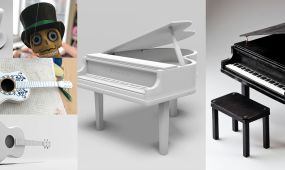 In this category you will find a number of different props in 3D models. Now you can print props of guitar, piano, and other musical instruments on a 3D printer.
In this category you will find a number of different props in 3D models. Now you can print props of guitar, piano, and other musical instruments on a 3D printer. Turn wood into a puppet according to your imagination. It is our imagination and energy that transform a piece of wood into a puppet. Wood has its own structure, which guides our chisel. If we are attentive and open to improvisation, even a random cut can inspire us on where to go next in seeking its shape and expression. Then, through it, we can tell stories...
Turn wood into a puppet according to your imagination. It is our imagination and energy that transform a piece of wood into a puppet. Wood has its own structure, which guides our chisel. If we are attentive and open to improvisation, even a random cut can inspire us on where to go next in seeking its shape and expression. Then, through it, we can tell stories... We will let you understand how to use puppets as an effective therapy tool. See how we are developing a methodology to teach this phenomenon. Join the global project and see the courses we run.
We will let you understand how to use puppets as an effective therapy tool. See how we are developing a methodology to teach this phenomenon. Join the global project and see the courses we run. Learn to assemble and decorate your own wooden puppet under the leadership of our experienced puppeteers and teachers. You can choose from courses that are simple or more advanced. Experience the joy of building your very own marionette.
Connect beauty and function. Reality and imagination. Matter and spirit. Puppet and puppeteer. The old puppeteers always said “A puppet must be made to be beautiful and to play itself”, and I would only add that this is a task full of many crafts.
Petr PuppeteerSenior Puppet Technologist – PUP
Learn to assemble and decorate your own wooden puppet under the leadership of our experienced puppeteers and teachers. You can choose from courses that are simple or more advanced. Experience the joy of building your very own marionette.
Connect beauty and function. Reality and imagination. Matter and spirit. Puppet and puppeteer. The old puppeteers always said “A puppet must be made to be beautiful and to play itself”, and I would only add that this is a task full of many crafts.
Petr PuppeteerSenior Puppet Technologist – PUP Here you will find courses on rules and techniques to set you free in expressing your intention with the puppets. A puppet is like a shield to hide behind. It's giving you the freedom to say and act whatever you feel and want. We will teach you the technique.
Here you will find courses on rules and techniques to set you free in expressing your intention with the puppets. A puppet is like a shield to hide behind. It's giving you the freedom to say and act whatever you feel and want. We will teach you the technique. 







